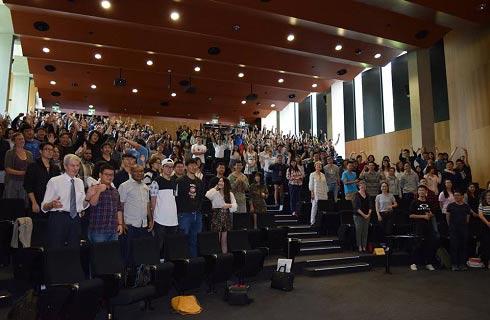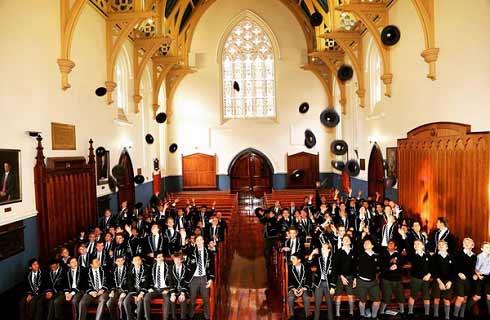文学士-语言学
Bachelor of Arts - Linguistics

学历文凭
Bachelor Degree

专业院系
Division of Humanities

开学时间

课程时长

课程学费

国际学生入学条件
We recognise many other qualifications as equivalent to the New Zealand qualification for entrance.
We also accept the following international qualifications:
- International Baccalaureate: IB Diploma with a minimum of 24 points.
- Cambridge International Examinations (CIE) GCE Advanced Levels: minimum Numerical Score of 8
- A minimum of CCC across the NCUK IFY
- Satisfactory completion of one year's study at a recognised tertiary institution.
English language requirements
IDP—雅思考试联合主办方

雅思考试总分
6.0
- 雅思总分:6
- 托福网考总分:80
- 托福笔试总分:160
- 其他语言考试:Pearson Test of English (PTE) Academic - Overall score of 50 with no communicative skills score below 42.
CRICOS代码: OO0001
申请截止日期: 请与IDP联系 以获取详细信息。
课程简介
Linguistics is the discipline that directly addresses what language is, why languages are similar and different, how languages develop, how languages work and how languages are taught and learned.Language involves everything we do every day, so studying what language is and how language works provides insights into everyday life. It is a useful and rewarding subject for anyone who is interested in languages of any kind, including computer and “invented” languages, as well as anyone interested in teaching and learning secondforeign languages.Linguistics complements other disciplines in the arts, such as English, communication studies, sociology, anthropology, education, languages and law, and other disciplines in the sciences, such as psychology, neuroscience, computer and information science, and maths.You will be taught how to identify and provide analyses of linguistic phenomena and how to construct and justify arguments for particular analyses.Although many students of Linguistics study another language, Linguistics at Otago does not assume any prior knowledge of linguistics or of any languages other than English.
相关申请
 预科
预科 奖学金
奖学金 实习机会
实习机会 在校学习
在校学习 跨境学习
跨境学习 校园授课-线上开始
校园授课-线上开始 在线/远程学习
在线/远程学习
开学时间&学费
学费信息仅供参考,请与IDP联系以获取详细信息
| 开学时间 | 时长 | 学费 | 地点 |
|---|
学校排名

世界排名201
数据源:
泰晤士高等教育世界大学排名
关于奥塔哥大学

成立于1869年的奥塔哥大学是新西兰第一所大学,拥有丰富而杰出的历史。奥塔哥大学在研究和教学方面享誉世界,在QS世界大学排名中位列全球前1%。奥塔哥大学在商业、健康科学和人文科学等领域提供了大量而多样化的学习选项。学生可以从200多门课程中选择。该大学在就业能力、国际化、教学和研究等方面均被QS评为五星。根据高等教育委员会(TEC)的教育表现指标,奥塔哥大学在学生表现和留存率方面也被评为新西兰第一。这强调了奥塔哥为学生提供的教育质量。该机构在新西兰各地都有校区,在达尼丁、惠灵顿、奥克兰、基督城和因弗卡吉尔都有校区。奥塔哥大学的学生群体也是多元化的,达尼丁校区85%以上的学生来自城市以外,全校有3000名国际学生入学。奥塔哥大学的学生享有良好的毕业成果,95%的学生在毕业后继续深造或就业。
本校相关课程
其他相关课程

中学11年级和12年级
 马特·克里斯蒂学院
马特·克里斯蒂学院学历文凭
Secondary School
开学日期
课程费用总额


应用语言学硕士-应用语言学
 昆士兰大学
昆士兰大学泰晤士高等教育世界大学排名:80
学历文凭
Masters Degree (Coursework)
开学日期
课程费用总额


国际研究学士-中文
 昆士兰大学
昆士兰大学泰晤士高等教育世界大学排名:80
学历文凭
Bachelor Degree
开学日期
课程费用总额


脑与精神科学研究生文凭
 悉尼大学
悉尼大学泰晤士高等教育世界大学排名:54
学历文凭
Graduate Diploma
开学日期
课程费用总额


脑与精神科学研究生证书
 悉尼大学
悉尼大学泰晤士高等教育世界大学排名:54
学历文凭
Graduate Certificate
开学日期
课程费用总额


脑与精神科学硕士
 悉尼大学
悉尼大学泰晤士高等教育世界大学排名:54
学历文凭
Masters Degree (Coursework)
开学日期
课程费用总额










 新西兰
新西兰





